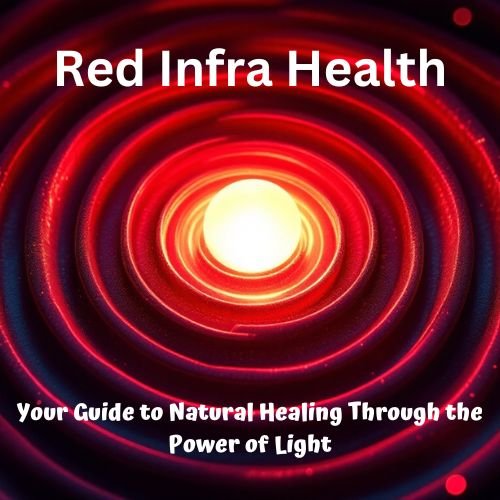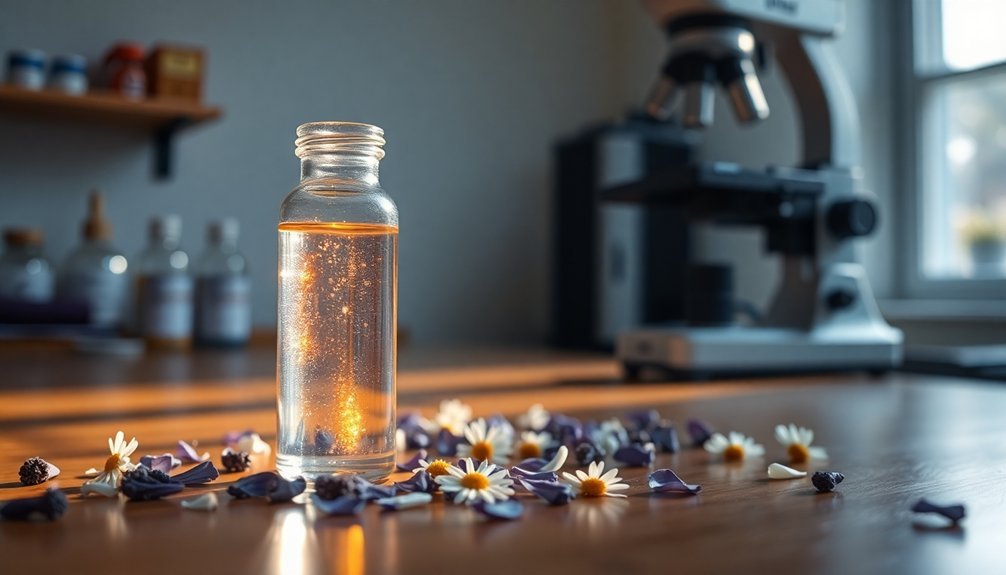If you're exploring natural energy remedies for depression, there are several options available beyond traditional treatments. Herbal supplements like St. John's Wort and saffron can enhance mood, while dietary changes, such as increasing omega-3s and reducing refined sugars, stabilize your mental health. Light therapy is another effective approach; it boosts serotonin and may improve symptoms in just a week. Regular exercise and mindfulness practices can also considerably boost your mood. Remember to consult with a professional before starting any new treatment. You might uncover even more strategies to enhance your mental well-being as you learn more about this topic.
Understanding Depression and Mood Enhancement

Understanding depression is essential for finding effective ways to enhance your mood. This serious medical condition affects how you think, feel, and act, with nearly 30% of adults experiencing it at some point. You might feel sad, irritable, or hopeless, potentially losing interest in activities you once enjoyed. For a diagnosis, symptoms need to persist most of the day, nearly every day, for over two weeks, negatively impacting your daily life.
Several factors contribute to your risk of depression. Biochemical variations in brain chemicals can play a significant role, along with genetic predispositions—like having a family history of the illness. Additionally, identical twins have a 70% chance of both having depression, highlighting the strong influence of genetics.
Personality traits, such as low self-esteem and a pessimistic outlook, can increase your vulnerability, as well as environmental stressors like poverty or abuse.
Keeping an eye on your daily activities can help you manage your mood effectively. Engaging in physical activities, enjoying meals high in serotonin, practicing mindfulness, and maintaining a gratitude journal are just a few strategies.
The Role of Light Therapy
Light therapy has emerged as an effective treatment option for those grappling with depression, especially when traditional methods fall short. This approach works by aligning your biological clock and regulating your brain's 24-hour cycle. By balancing serotonin activation, it helps improve your mood and contributes to more stable sleep patterns. You may find yourself feeling more alert and energized during the day.
Typically, light therapy involves sitting near a lightbox or lamp that emits 2,500 to 10,000 lux of light intensity. To get the best results, schedule your sessions in the morning, preferably between 6:00 a.m. and 9:00 a.m. Each session should last anywhere from 30 to 60 minutes. Keep your eyes open while the light is on, but don't stare directly at it; you can read or work during this time.
Additionally, consistent use of light therapy may help reset circadian rhythms, promoting a more regular sleep pattern and enhancing overall well-being. Many users notice improvements in their depressive symptoms within just a week of starting light therapy. This treatment option is generally safe, with mild side effects that can be easily managed.
Consult a healthcare professional before beginning light therapy to confirm it's right for you and to discuss any specific concerns.
Benefits of Red Light Therapy

Red light therapy offers a promising approach to tackling depression, building on the principles established by light therapy. By targeting your cells' mitochondria, it enhances energy production while increasing blood flow to the brain, promoting cognitive function.
This therapy can activate the dorsal raphe nucleus, leading to more serotonin release, which is crucial in alleviating depressive symptoms. Studies show improvements in depression symptoms after one hour of light therapy, indicating its potential effectiveness.
Here are some key benefits you'll experience with red light therapy:
- Mood Boost: It elevates dopamine levels, helping you feel more pleasure and motivation.
- Sleep Stability: Restoring circadian rhythms contributes to consistent sleep patterns, enhancing overall well-being.
- Cognitive Clarity: You'll notice improved mental clarity and reduced symptoms of seasonal depression.
Additionally, red light therapy reduces neural inflammation and combats oxidative stress, further supporting better mental health.
It's clinically proven for depression and anxiety, showing significant effects in studies. Best of all, it's easy to use at home with minimal side effects and can start showing results after just a few sessions.
Infrared Therapy for Mood Improvement
Infrared therapy harnesses the power of near-infrared light to boost your brain's energy, helping combat the low energy associated with depression.
Recent studies reveal significant mood improvements in patients undergoing this treatment, making it a promising option for those seeking alternatives to traditional therapies.
Let's explore how this mechanism works and what the research suggests about its effectiveness.
Mechanism of Action
Using specific wavelengths of infrared therapy, you can harness a range of mechanisms that promote mood improvement and overall mental health. This therapy activates ATP production, enhancing cellular energy essential for the repair and growth of tissues, especially those affected by stress or injury.
Here's how it works:
- Endorphin Release: Increased ATP leads to endorphin production, acting as natural mood elevators while providing pain relief. You'll feel less discomfort and a boost in your overall well-being.
- Reduced Inflammation: Infrared light reduces inflammation in brain cells, which is fundamental for alleviating symptoms of depression and anxiety. Healthier brain tissues improve mental clarity and emotional stability.
- Improved Circulation: Enhanced blood flow guarantees your brain receives adequate oxygen and nutrients, supporting healing and peak function. This circulation helps eliminate toxins, improving your overall health.
With these mechanisms working together, infrared therapy not only improves mood but also supports the health of your entire body.
This holistic approach can greatly enhance your mental well-being and resilience against stressors.
Research Findings Summary
Research has shown significant promise in the effectiveness of infrared therapy for improving mood and alleviating symptoms of depression. In the Elated-2 pilot trial, transcranial near-infrared light therapy was tested on patients with major depression. An impressive 36 out of 39 participants exhibited major improvements, with 32 achieving remission. Remarkably, the frequency of treatments played a key role—those treated more frequently enjoyed better outcomes.
Long-term effects are also significant; some patients remained in remission for up to 55 months post-treatment. The therapy has proven to be well-tolerated, causing minimal side effects like headaches or muscle fatigue in a few cases. Infrared light therapy showed medium to large effect sizes in reducing depressive symptoms and even cut the risk of Seasonal Affective Disorder by half.
Beyond major depression, this approach has also shown potential in treating anxiety disorders and mood changes related to mitochondrial diseases.
Patient experiences reflect the therapy's benefits, with many describing increased energy, motivation, and improved sleep. Family members noticed these uplifting changes as well, further emphasizing the transformative impacts of infrared therapy on mood and overall well-being.
Natural Remedies to Support Treatment

Natural remedies can play a considerable role in supporting treatment for depression, and several approaches stand out as particularly effective. These remedies can enhance mood, stabilize energy levels, and complement traditional treatments.
– Dietary changes: Eating balanced meals regularly, reducing refined sugars, and increasing omega-3 intake can considerably improve mood stability.
Incorporating foods rich in vitamins and minerals like folic acid and iron also supports neurotransmitter health.
– Herbal supplements: Consider St. John's Wort for mild to moderate depression, but consult with your doctor first due to potential interactions.
Saffron supplements and SAMe are also worth exploring as they can enhance serotonin and dopamine production.
– Lifestyle adjustments: Regular exercise increases endorphins, and spending time outdoors for sunlight exposure can be uplifting.
Engage in enjoyable activities with friends or pets to combat loneliness and enhance your mood.
Combining Light Therapy With Mindfulness
Incorporating light therapy alongside mindfulness techniques can greatly amplify your efforts to combat depression. Light therapy enhances serotonin production, which helps regulate your mood and alleviates symptoms of anxiety and depression. When you meditate, this effect is heightened, increasing not just serotonin, but also dopamine and GABA levels, resulting in a more profound 'feel-good' experience.
Regular exposure to bright light in the morning helps synchronize your circadian rhythms, improving your sleep quality. As you practice mindfulness and meditate, the physiological effects of light therapy on your sleep enhance even further, reducing the time it takes you to fall asleep and improving sleep efficiency.
The combination of light therapy and meditation considerably reduces stress and anxiety, promoting relaxation and feelings of tranquility. The soothing effects become more pronounced as you deepen your mindfulness practice.
Additionally, light therapy improves your focus during meditation, enhancing cognitive function and overall mental clarity.
Dietary Changes for Enhanced Well-being

Enhancing well-being through dietary changes can greatly impact your mental health. What you eat plays a significant role in how you feel, and adopting beneficial diets can help reduce depressive symptoms.
Here are some key dietary habits to take into account:
- Focus on whole foods: Embrace the Mediterranean or DASH diet, incorporating fruits, vegetables, whole grains, and lean proteins.
- Add nutrient-rich foods: Include omega-3 fatty acids from fish or seeds and antioxidant-rich berries to combat stress-related symptoms.
- Limit processed foods: Reducing your intake of refined foods can improve your depression outcomes.
Incorporating these changes not only boosts your energy levels but also fosters a healthier gut microbiota, supporting your overall mental well-being.
Daily vegetable consumption and a high intake of fiber can further enhance these benefits.
While dietary changes are no substitute for professional help, they can complement your mental health treatments effectively.
Remember to consult with mental health professionals before making significant modifications to your diet.
Lifestyle Adjustments for Better Mental Health
Making changes to your lifestyle can considerably boost your mental health alongside dietary improvements. Regular physical activity is crucial; it reduces depression symptoms and improves your overall well-being. Even small actions—like walking, climbing stairs, or stretching—can create momentum. Aim for strength training and aerobic exercise most days of the week for ideal results.
Mind-body practices like mindfulness can also help. Implement techniques such as meditation, yoga, or tai chi to reduce stress hormones and improve your focus. These practices can reshape your brain's response to stress and emotions, fostering long-term mental health.
Restorative sleep shouldn't be overlooked. Aim for 7 to 9 hours per night and maintain a consistent sleep schedule. Avoid screens before bed and engage in a calming bedtime routine, like reading or meditating, to enhance sleep quality. This will, in turn, energize you for daily activities.
Lastly, prioritize social connections. Reach out to friends and family daily or join local support groups to nurture a sense of belonging. These interactions boost your mood and lower stress levels—essential components for better mental health.
Implementing these lifestyle adjustments can lead to significant improvements in your overall mental well-being.
Evaluating Effectiveness of Natural Approaches

When evaluating the effectiveness of natural approaches to depression, both scientific research and personal experiences play vital roles.
You'll want to contemplate the validity of studies backing these remedies and how they resonate with your individual journey.
Understanding this balance can help you make informed decisions about your mental health strategies.
Scientific Research Validity
Evaluating the scientific research surrounding natural remedies for depression reveals several important considerations.
While some studies suggest potential benefits, their validity can be tricky to ascertain due to various issues.
- Many studies have small sample sizes, raising questions about how widely applicable the results are.
- The lack of randomized controlled trials means findings often lack the rigorous scrutiny seen in conventional treatments.
- Short treatment durations make it difficult to evaluate long-term effectiveness and safety.
Furthermore, potential interactions with other medications can complicate their use.
For instance, St. John's wort may reduce the efficacy of your current antidepressants, while other remedies like ginseng can interact with warfarin.
Additionally, the FDA doesn't regulate supplements as drugs, leading to quality variations among products.
With these factors in mind, it's crucial to approach natural remedies with caution.
Always consult a healthcare professional before starting any new supplement.
Gaining a deeper understanding of the research behind these treatments can help you make informed decisions about your mental health.
Personal Experience Impact
Natural approaches to managing depression often hinge on personal experiences that can greatly affect their effectiveness. For example, meditation and mindfulness can lead to a 10% to 20% improvement in your depression symptoms. You might find that by practicing mindfulness meditation, you can pause troubling thoughts, making them less bothersome. Learning from an experienced teacher can greatly enhance your experience and outcomes.
Incorporating gentle exercise like walks or yoga can also be transformative. You release dopamine, which is vital for managing depression, and even minimal activity can help reduce stress and promote relaxation. It feels achievable when intense workouts seem overwhelming.
Herbal remedies such as St. John's wort or lavender essential oil may offer additional relief, although it's important to watch for potential interactions with medications.
Additionally, dietary changes can aid your experience. Vitamin D or B-complex vitamins may improve mood, especially if you're not getting enough sunlight or vital nutrients.
Ultimately, your personal journey with these natural remedies will shape their effectiveness. Each experience offers insights, enabling you to tailor your approach to managing depression in a way that resonates with you.
Frequently Asked Questions
How Quickly Can I See Results From Natural Remedies?
You might see initial results from natural remedies within a few days to weeks, depending on the specific remedy. However, consistency and patience are key, as everyone's response can vary considerably.
Are There Any Side Effects of Herbal Supplements?
Yes, herbal supplements can cause various side effects, including allergic reactions, headaches, and gastrointestinal issues. Some may also interact with medications, increasing risks like bleeding or liver damage, so consult your doctor before starting them.
Can I Practice Mindfulness Meditation Alone?
Yes, you can practice mindfulness meditation alone. Focus on your breath, start with short sessions, and gradually extend them. Consistency and self-discipline are key, so keep practicing and be patient to experience the benefits.
What Dietary Foods Should I Avoid for Better Mood?
To improve your mood, you should avoid processed meats, refined carbs, added sugars, and trans fats. Additionally, limit caffeine and artificial sweeteners, as these can lead to irritability, anxiety, and overall negative emotional states.
How Do I Choose the Right Exercise for Mood Improvement?
To choose the right exercise for mood improvement, explore activities you enjoy, like running or yoga. Start small and gradually increase intensity. Mixing different exercises keeps things fresh and helps maintain motivation for long-term benefits.
In Summary
Incorporating natural energy remedies can empower you in your journey to enhance your mood and alleviate depression. By exploring light therapies, dietary adjustments, and lifestyle changes, you can create a holistic approach that complements traditional treatments. Remember to be patient and give yourself time to experience the benefits. With determination and a willingness to try new strategies, you'll find the support you need for better mental health and overall well-being. Embrace your path to brighter days!





Leave a Reply